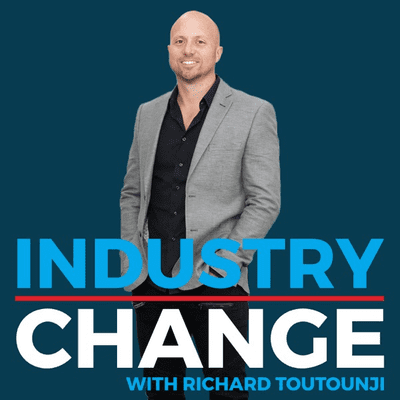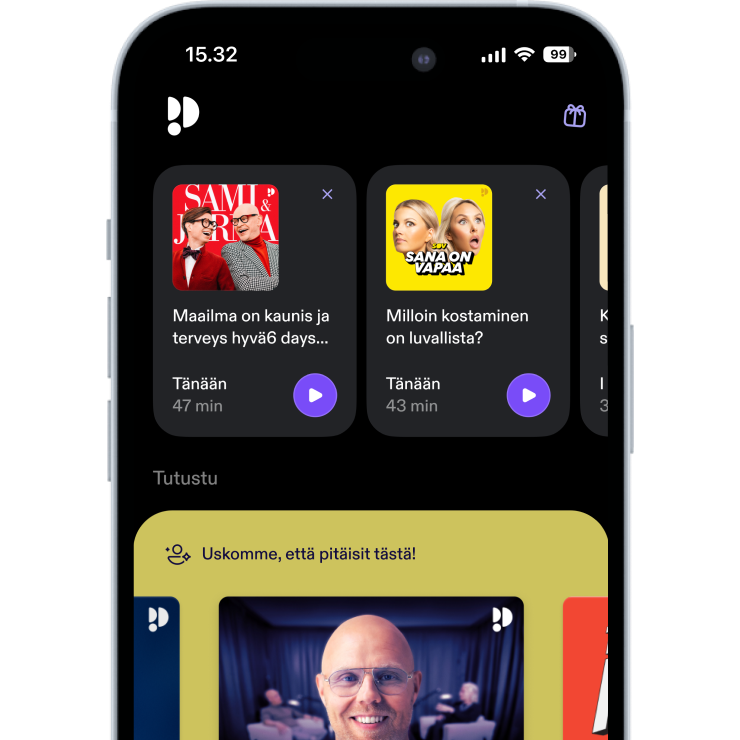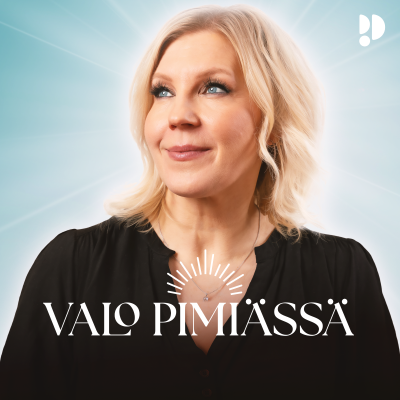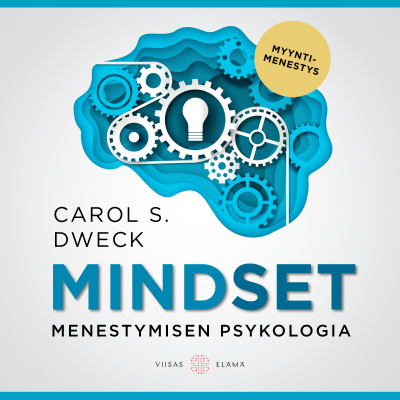
Industry Change
Podcast by Richard Toutounji
30 vrk ilmainen kokeilu
Kokeilun jälkeen 7,99 € / kuukausi.Peru milloin tahansa.

Enemmän kuin miljoona kuuntelijaa
Tulet rakastamaan Podimoa, etkä ole ainoa
Arvioitu 4.7 App Storessa
Lisää Industry Change
Richard Toutounji is talking to masters of business who have prospered by adapting to change in their industry.
Kaikki jaksot
17 jaksotWant to know the importance of technology and mental health in the fitness industry? In this episode Richard chats with the Chief Operating Officer of LIFT Brands Andy Peat. Andy was 17 when he started out in the industry, conveniently not having to tell anyone his age… he was a personal trainer, worked on cruise liners and then became a SNAP fitness franchisee and from this he became the CEO of SNAP fitness Australia at the age of 25. Now he is the COO of LIFT Brands and the creator of technology fitness and nutrition app ‘Nomergy’. Take a read or watch the full interview… What are the fundamentals of growing in the fitness industry? Andy’s quick progression in the industry was a credit to timing, luck and proven skills. He also emphasises the importance of putting yourself out there and know what people want to hear, from this he got the opportunity to learn and prove himself once he was in the role as CEO. When Andy started as CEO he has no right to the job, he didn’t have a degree or much experience but he was great at selling franchises and selling gym memberships, but obviously running a $100 million business was next level! So he talked to the right people, educated himself and delivered results! How do you deliver the results when you are still learning? Observe and learn – During the first three months as CEO Andy he took a back seat and observed what the operators did, he learnt the goods and the bads within the industry from this. Back yourself – Andy had to back his own ideas and add his own flavour to the business. Andy believes “It’s one thing to back yourself but actually going in and doing it is another.” A big thing that distinguished him was that he followed through with his ideas. Work WITH people – Andy always enjoyed working with people and building relationships. He has a lot of empathy because he was a previous SNAP franchisee so the SNAP franchisees were able to relate to him and be on the same page because of his experience. Educate yourself – Outside of work during the early stages of Andy being CEO, he was in a relentless study mindset. He studied business, he became a student of business, fitness and of the industry. He learnt from people 100 years ago and explored the tycoons of the industry today. He read and listened to everything he could in his free time. At the time he wasn’t sure it was working but over time he realised he was using things he learnt. Did the need to educate yourself come because you had the job or did it come because you wanted to know it in the future? It was a bit of both for Andy, but there was an urgent need to educate himself because he had the job. He didn’t tell anyone his age so people assumed he was older. The motivation came to learn ‘adult talk’ early so he could stand at the same level with the franchisees and give himself enough time to deliver results. He knew he could get the results but he wanted to buy some time to be able to develop a stronger understanding and back himself on different things in the industry. The true test was dealing with adversity, since he was still young he could get stuck into fixing problems rather than delegating others to do them. Looking into the future, saw the problems with sales, mental health and has created an app. At the time Andy was CEO of SNAP fitness in Austr
In this week’s episode of Industry Change I chat with Ty Menzies the CEO of LIFT Brands. Ty has had over 15 years of experience in this industry with a background of owning independent clubs, franchises and is now the CEO of LIFT Brands with over 300 locations across the Asia-pacific. Recently Ty was elected as a a Board Member of Fitness Australia and the Exercise Association of New Zealand. We discuss how to succeed in the industry and take advantage of the right opportunities at the right time and more. Ty’s journey in the fitness industry Ty’s journey has not been an overnight success story. He started as a personal trainer and really enjoyed it, but always knew he wanted to be a business owner and wanted to step into a sales and club management role. He had great mentors and took good advice from the right people that guided him into the sales and club management space. The first club he managed was a very large gym in London which was a great experience, he was hired by the owner of The Gym Group (UK), John Treharne who has taken that business from nothing to now 60 locations! Ty was lucky by being involved with the right people, actively putting himself out there in the industry. He came back from the UK and wanted to start his own business. He came across a franchise, EFM Health Clubs which is still around today and he bought his first EFM at the age of 21 and then went on to own 3 EFM locations in Melbourne. Whilst he had these 3 he then bought a mid-size independent club. This was an opportunity that he came across and it was in a dire position but he turned it around and made it successful, so at the time he owned 4 gym venues! He then sold them to move onto his next venture. Snap fitness approached him to help drive the franchise development part of the business. He spent months developing franchises and sold 35 franchises and was in a good position to be the CEO which has only progressed from there. What is LIFT Brands? Ty is the CEO of LIFT Brands which is a collection of fitness-minded businesses that share a goal to help people get healthy in a positive community. They own snap fitness 24/7 which covers all hours convenience, 9Round which is more boutique and fitness on demand which is virtual. All these brands cover key fitness environments for all demographics. They have a very strong presence in New Zealand and Australia and are expanding across the Asia-pacific region. When is the right time to make the right move? The importance of opportunities and timing… Peter Taunton the founder of LIFT Brands says that, “If you haven’t failed in business you haven’t had a go!” Ty has had his fair share of failures but strongly believes that if you aren’t having a go you aren’t experiencing the industry and growing beneficially. Ty stresses that it is important to know that if you fail, fail fast and step out quickly. Some people try and hold on too long, but realising the problem, losing a small amount of money, stepping out of the situation and learning from it is how you can be proactive in the industry. A lot of fitness professionals can over analyse things and opportunities come and go all the time, it’s a matter of whether you will take the chance and run with it. Ty’s father used to say, “Take a huge bite and go at it hard!” That’s something you have to do with business. You can’t expect to go into something and just have it all done with no effort, you need to put in the work! Where do you see the future of the 24/7 gyms?
In this week’s episode of Industry Change, I chat with Ty Menzies the CEO of LIFT Brands. Ty has had over 15 years of experience in this industry with a background of owning independent clubs, franchises and is now the CEO of LIFT Brands with over 300 locations across the Asia-pacific. Ty’s journey in the fitness industry Ty’s journey has not been an overnight success story. He started as a personal trainer and really enjoyed it, but always knew he wanted to be a business owner and wanted to step into a sales and club management role. He had great mentors and took good advice from the right people that guided him into the sales and club management space. The first club he managed was a very large gym in London which was a great experience, he was hired by the owner of The Gym Group (UK), John Treharne who has taken that business from nothing to now 60 locations! Ty was lucky and was involved with the right people, actively put himself out there in the industry. He came back from the UK and wanted to start his own business. He came across a franchise, EFM Health Clubs which is still around today and he bought his first EFM at the age of 21 and then went on to own 3 EFM locations in Melbourne. Whilst he had these 3 he then bought a mid-size independent club. This was an opportunity that he came across and it was in a dire position but he turned it around and made it successful, so at the time he owned 4 gym venues! He then sold them to move onto his next venture. Snap fitness approached him to help drive the franchise development part of the business. He spent months developing franchises and sold 35 franchises and was in a good position to be the CEO which has only progressed from there. What is LIFT Brands? Ty is the CEO of LIFT Brands which is a collection of fitness-minded businesses that share a goal to help people get healthy in a positive community. They own snap fitness 24/7 which covers all hours convivence, 9Round which is more boutique and fitness on demand which is virtual. All these brands cover key fitness environments for all demographics. They have a very strong presence in New Zealand and Australia and are expanding across the Asia-pacific region. When is the right time to make the right move? The importance of opportunities and timing… Peter Taunton the founder of LIFT Brands says, “If you haven’t failed in business you haven’t had a go!” Ty has had his fair share of failures but strongly believes that if you aren’t having a go you aren’t experiencing the industry and growing beneficially. Ty stresses that it is important to know that if you fail, fail fast and step out quickly. Some people try and hold on too long, but realizing the problem, losing a small amount of money, stepping out of the situation and learning from it is how you can be proactive in the industry. A lot of fitness professionals can over-analyze things and opportunities come and go all the time, it’s a matter of whether you will take the chance and run with it. Ty’s father used to say, “Take a huge bite and go at it hard!” That’s something you have to do with business. You can’t expect to go into something and just have it all done with no effort, you need to put in the work! Where do you see the future of the 24/7 gyms? These days it is so easy to get the 24/7 gym, it is an important incentive for a consumer because people don’t live in the 9-5 world anymore. While Ty’s facilities see 80% of people turning up at the peak 6 am-6 pm times, there is still a lot of people turning up during outside hours, especially with people from different areas, different demographics, and different cultural backgrounds. 24/7 is something that clubs should consider but it isn’t the be-all and end-all. The convenience of 24/7 a
In today’s Industry Change episode I chat with Richard Beddie CEO of Exercise New Zealand about the journey. Richard has been in the industry for over 20 years, initially, he was a gym owner and eager to learn more he went to a fitness industry conference. He did this because he figured that people who knew more than him about the industry would be talking and giving worthy advice, so he went along and found the AGM for Fitness New Zealand. How did you start this journey of running an organization and going global? When Richard owned a gym the first thing he did was go to a conference because he figured people who knew more than him would be talking and giving advice so he went along and found the AGM for fitness NZ. He asked a lot of questions and the next thing he knew he was on the committee and became the chairman. At the time he thought it was a great way to give his input and make an impact on the industry. He realized that his passion changed from owning his gym and getting leads to being about dealing with childcare because a the time it was a big industry issue with gyms regulation. He wasn’t being paid for this, it was all volunteer work.What is Exercise NZ? Exercise NZ is an association that is about making a difference and supporting exercise professionals and facilities within the fitness industry. They are quite unique as an organization because they facilitate things like events and resources. It is the providers like personal trainers, gym owners, etc. that make the difference, and this is what Exercise NZ wants to support. They want to support the providers. Exercise NZ has the highest uptake of members in the association because they believe it’s all about asking: what do the providers of exercise want? It is about the long game with solving the physical inactivity that NZ has but it is about the short game with providers and supporting their problems. It is a Not for profit body and membership association. The members are providers of exercise, whether that be gym owners, personal trainers or fitness instructors, it is for anyone who works in the fitness industry. By being a member they get support, advice, advocacy from Exercise NZ and they get to go to events at a discounted rate. They are not about the commercial end even though many of their members are. The individual personal trainer, yoga instructor or fitness studio owner can do what they do with the backing of an industry association like Exercise NZ behind them. It is basically an insurance policy to help your fitness business run successfully. They can help you with the stuff you may not know, like the new laws, regulations, and governance that is important to comply with but many people won’t know or don’t have the time to focus on. How did you take this concept of fitness industry standards globally? In 2001 Richard wanted to help develop standards for exercise professionals which are now the register for fitness professionals. New Zealand was the 3rd country in the world to have these standards. Some people are anti-standards but there is nothing to be scared about because professionals can always vote to change the standards that are in place. Richard once had a meeting in Lebanon and it was the first time industry competitors were in the same room. It is a very small country geographically but there are lots of gyms and personal trainers, however, there isn’t a lot with qualifications. This is an example of emerging standards as there are emerging training providers. It can be frustrating for those who are qualified if there are no standards because the qualification essentially has no value. Hence Richard gave them a chance to join an international grouping that has standards. Now there is the global association that means your qualifications
In this episode of Industry, Change Richard talks to Luke Baylist co-founder and CEO of Australia’s biggest health food chain: Sumo Salad. At one point for a long time, Sumo Salad had 92% brand awareness in the market as they were the first health food chain in Australia. Now after 16 years Luke Baylis has created Sumo Well which aims to combine fitness and food together. How did Luke start out as an entrepreneur? Going back to the beginning Luke says the beginning of his entrepreneurial career was not a ‘glamourous story’. In the early 2000s Luke and his best friend were living in Chicago working for an IT company. He was young, eating all the wrong foods and drinking and within 4 years he put on 50kg. He found that in America when you ate a salad it was almost the size of a table and it wasn’t healthy either! He realized he had no portion control, no healthy food options and was not exercising. In Australia, he was used to living a fit and healthy lifestyle, so when he went back to Australia he was unrecognizable. Whilst trying to get back on track with being healthy he found it hard to make good nutritional choices as there was a lack of availability and it wasn’t affordable to eat healthy. Luke realized there was no culture in Australia that promotes nutritional food as something accessible and affordable and this is how the idea of Sumo Salad was formed. Luke wanted to make a healthy food chain that turned a salad into a big healthy satisfying meal. He wanted to change Australia’s perception of healthy eating. They knew there was a demand for this and despite being shut down by investors they persisted with this idea to change the way Australia eats and creates a better option for people. In 16 years Sumo Salad grew to over 100 locations and was the first fresh and healthy food chain to make its mark in Australian food courts. As a self-funded business they faced many challenges but they had to focus on getting good locations and trading in local communities to establish a following. They had $90 million in turnover and no real competitors because this was at a time before the wellness lifestyle was popular. However as the business grew, the competition grew at the same time. For the first 10 years, they withstood competitors and food courts were the main place they were franchised. However, over time the food court became less relevant for the consumer and cafe culture was adopted. Instinctively luke thought that if Sumo Salad did not adapt the business would die. A change had to be made in order for Sumo Salad to sustain itself. Hence they took the move to shift their whole strategy and create Sumo Well that provides fresh and healthy grab and go options for Aussies. Luke strived to adapt to the fitness and wellness industry and he did so with a series of tests, a broadened network and thinking holistically about what the customer journey is now. Most Sumo Salad customers were active in gyms or using personal trainers and Luke realized that Sumo Salad couldn’t grow if it was just a salad bar in shopping centers. In order to progress Luke needs to collaborate with like-minded brands and surround the customer with better options, hence Sumo Well was created to be the partner of choice for gyms, personal trainers and fitness leaders. This has broadened their network and sphere of work to partner with fitness professionals who care about their clients’ health and wellbeing. What is the one thing that made Sumo Salad change? Luke said that constantly asking ‘but why’ was what helped him reframe the business. They kept asking this to refine their purpose to the point that they realized they don’t have to focus on a small niche. They can branch out to a bigger audience and the purpose is more powerful because it changes the way people eat and how they consume nutrition. Through reframing their purpose

Arvioitu 4.7 App Storessa
30 vrk ilmainen kokeilu
Kokeilun jälkeen 7,99 € / kuukausi.Peru milloin tahansa.
Podimon podcastit
Mainoksista vapaa
Maksuttomat podcastit

































